2026 高三一轮复习外研版(2019)必修 第一册Unit 2 Exploring English 词汇复习 课件(共21张PPT)
文档属性
| 名称 | 2026 高三一轮复习外研版(2019)必修 第一册Unit 2 Exploring English 词汇复习 课件(共21张PPT) |  | |
| 格式 | pptx | ||
| 文件大小 | 913.6KB | ||
| 资源类型 | 教案 | ||
| 版本资源 | 外研版(2019) | ||
| 科目 | 英语 | ||
| 更新时间 | 2025-07-16 18:58:08 | ||
图片预览

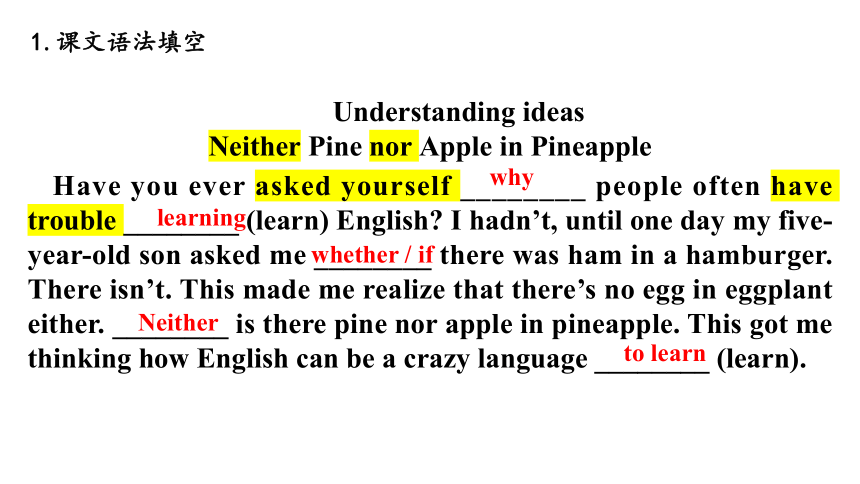
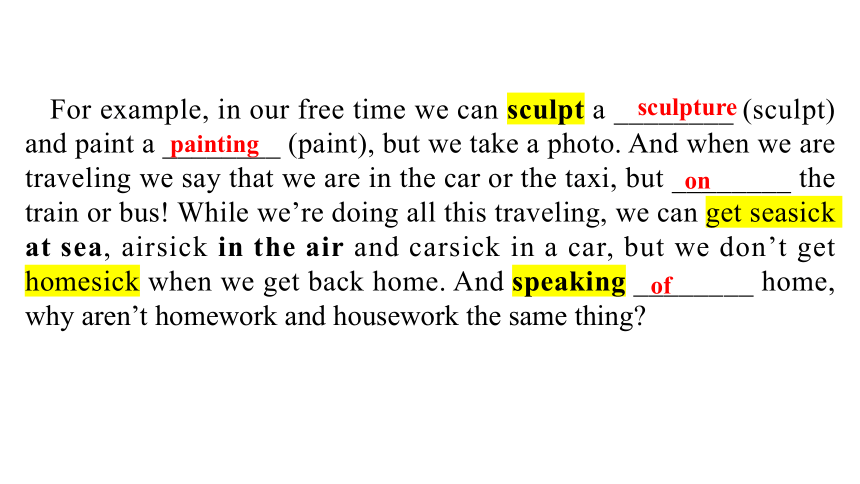
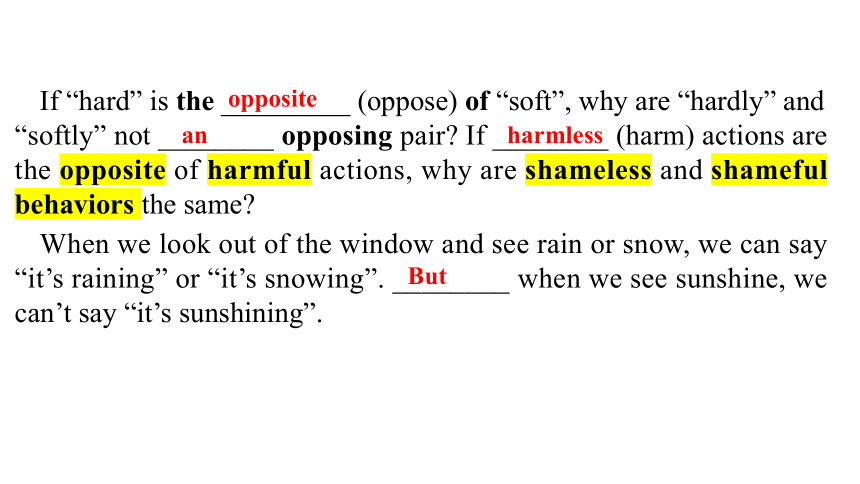
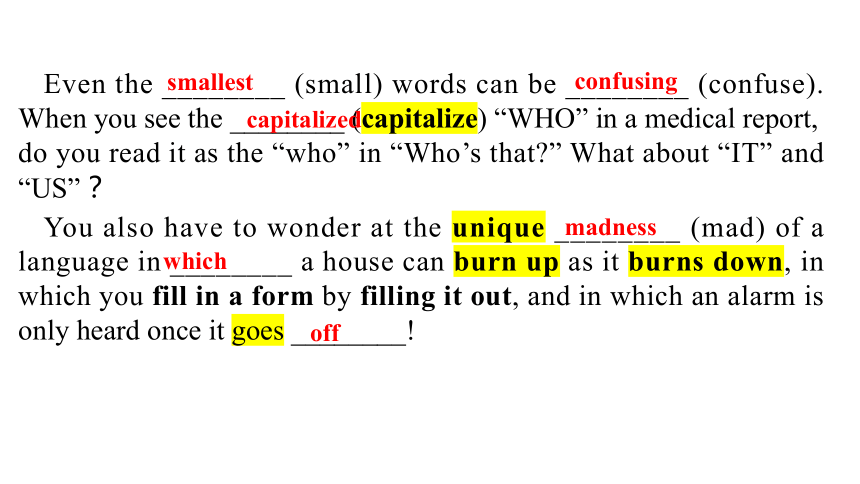
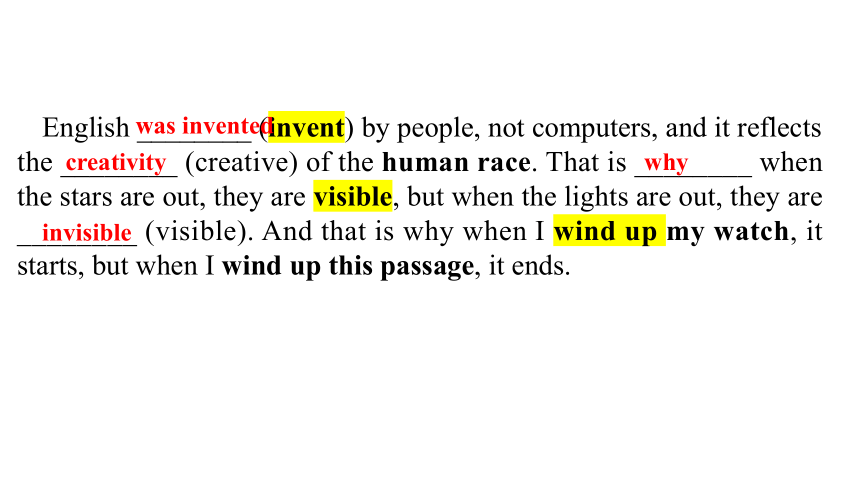
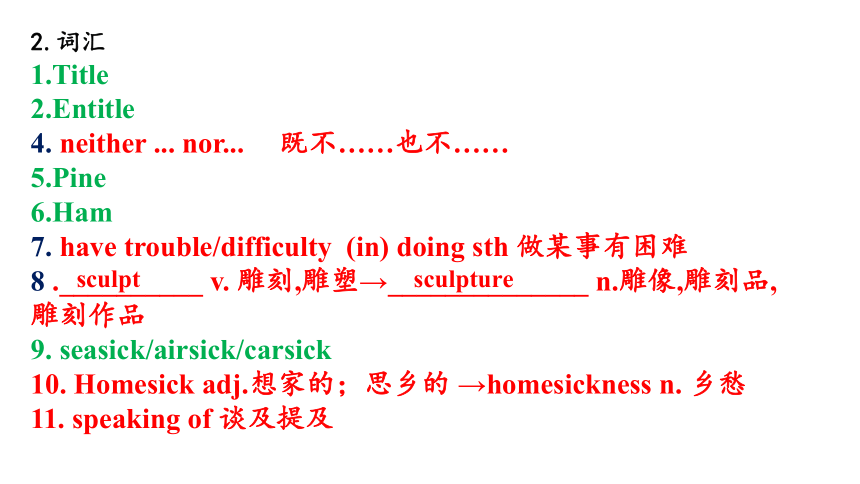
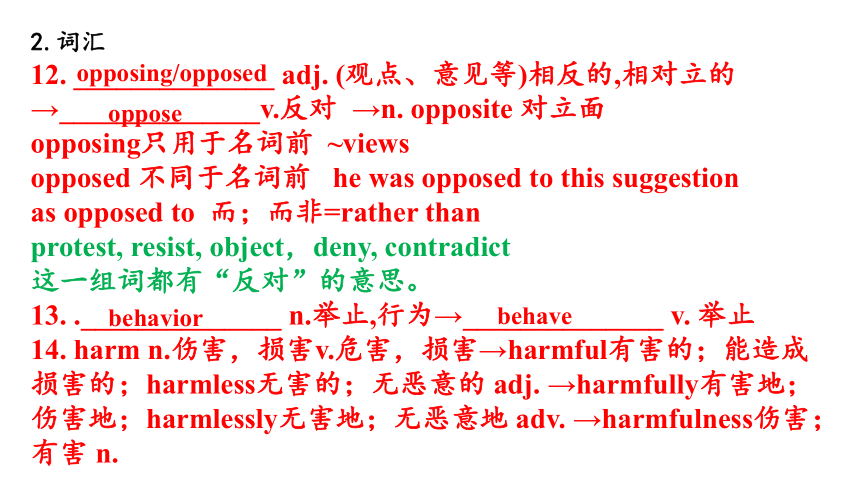
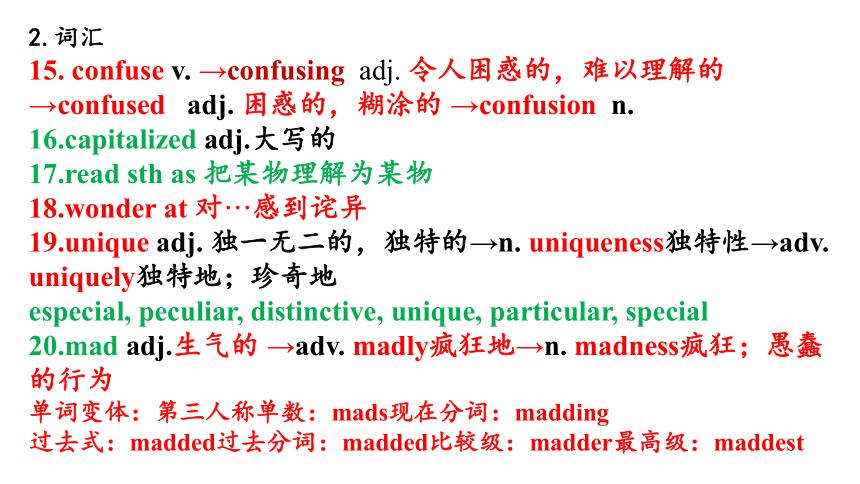
文档简介
(共21张PPT)
2026 高三一轮复习
词汇复习
Unit2 Exploring English
话题: 人际交往 人与社会
1.课文语法填空
Understanding ideas
Neither Pine nor Apple in Pineapple
Have you ever asked yourself ________ people often have trouble ________ (learn) English I hadn’t, until one day my five-year-old son asked me ________ there was ham in a hamburger. There isn’t. This made me realize that there’s no egg in eggplant either. ________ is there pine nor apple in pineapple. This got me thinking how English can be a crazy language ________ (learn).
why
learning
whether / if
Neither
to learn
For example, in our free time we can sculpt a ________ (sculpt) and paint a ________ (paint), but we take a photo. And when we are traveling we say that we are in the car or the taxi, but ________ the train or bus! While we’re doing all this traveling, we can get seasick at sea, airsick in the air and carsick in a car, but we don’t get homesick when we get back home. And speaking ________ home, why aren’t homework and housework the same thing
sculpture
painting
on
of
If “hard” is the _________ (oppose) of “soft”, why are “hardly” and “softly” not ________ opposing pair If ________ (harm) actions are the opposite of harmful actions, why are shameless and shameful behaviors the same
When we look out of the window and see rain or snow, we can say “it’s raining” or “it’s snowing”. ________ when we see sunshine, we can’t say “it’s sunshining”.
opposite
an
harmless
But
Even the ________ (small) words can be ________ (confuse). When you see the ________ (capitalize) “WHO” in a medical report, do you read it as the “who” in “Who’s that ” What about “IT” and “US”?
You also have to wonder at the unique ________ (mad) of a language in ________ a house can burn up as it burns down, in which you fill in a form by filling it out, and in which an alarm is only heard once it goes ________!
smallest
confusing
capitalized
madness
which
off
English ________ (invent) by people, not computers, and it reflects the ________ (creative) of the human race. That is ________ when the stars are out, they are visible, but when the lights are out, they are ________ (visible). And that is why when I wind up my watch, it starts, but when I wind up this passage, it ends.
was invented
creativity
why
invisible
2.词汇
1.Title
2.Entitle
4. neither ... nor... 既不……也不……
5.Pine
6.Ham
7. have trouble/difficulty (in) doing sth 做某事有困难
8 .__________ v. 雕刻,雕塑→______________ n.雕像,雕刻品,雕刻作品
9. seasick/airsick/carsick
10. Homesick adj.想家的;思乡的 →homesickness n. 乡愁
11. speaking of 谈及提及
sculpt
sculpture
2.词汇
12. ______________ adj. (观点、意见等)相反的,相对立的
→______________v.反对 →n. opposite 对立面
opposing只用于名词前 ~views
opposed 不同于名词前 he was opposed to this suggestion
as opposed to 而;而非=rather than
protest, resist, object,deny, contradict
这一组词都有“反对”的意思。
13. .______________ n.举止,行为→______________ v. 举止
14. harm n.伤害,损害v.危害,损害→harmful有害的;能造成损害的;harmless无害的;无恶意的 adj. →harmfully有害地;伤害地;harmlessly无害地;无恶意地 adv. →harmfulness伤害;有害 n.
opposing/opposed
oppose
behavior
behave
2.词汇
15. confuse v. →confusing adj. 令人困惑的,难以理解的→confused adj. 困惑的,糊涂的 →confusion n.
16.capitalized adj.大写的
17.read sth as 把某物理解为某物
18.wonder at 对···感到诧异
19.unique adj. 独一无二的,独特的→n. uniqueness独特性→adv.
uniquely独特地;珍奇地
especial, peculiar, distinctive, unique, particular, special
20.mad adj.生气的 →adv. madly疯狂地→n. madness疯狂;愚蠢的行为
单词变体:第三人称单数:mads现在分词:madding
过去式:madded过去分词:madded比较级:madder最高级:maddest
2.词汇
21.burn up 烧毁;消耗(体内的能量)
22.brun down 烧成平地;烧毁
23.alarm n.警报;闹钟;惊恐 v.使不安,使恐慌→adj. alarming令人担忧的;使人惊恐的→adj. alarmed惊恐的;受惊的;焦虑的
24. reflect v. 反射;显示,表明,深思→adj. reflective反射的;反映的;沉思的→adv. reflectively反映地;反照地→ n.reflection反射;沉思;映象
25.go off (警报,闹钟)突然响起
26.invent v.发明,创造→n. invention发明;发明物;虚构;
27.creative adj. 创造(性)的→adv. creatively创造性地;→n. creation创造,创作物→n. creativity创造力;创造性→vt. create创造,创作;造成
2.词汇
28.visible adj.看得见的;明显的,引人注目的→ adj. invisible 不可见的,无形的→adv. visibly明显地;显然;看得见地→ n. vision视力;美景→ n. visibility能见度,可见性
单词变体
比较级:more visible
最高级:most visible
29. so as to do =in order to do
30.when it comes to (doing) sth 说到(做)某事
31.lead to /result in/bring about 致使导致
32.type n.类型,种类v.打字→typist n.打字员
e across 偶然遇到;被理解;给人以···印象(come over)
34.familiar adj. 熟悉的;常见的→unfamiliar adj. 不熟悉的;陌生的 → n. familiarity熟悉,精通
35.scary adj.骇人的,恐怖的→ vt. scare惊吓;把…吓跑
2.词汇
36.contact n. 接触;联系;门路;熟人 v. 联络某人
37.flat n. 公寓 adj. 平坦的;浅的→ v. flatten 使变平
现在分词:flatting 过去式:flatted
过去分词:flatted 比较级:flatter 最高级:flattest
38.context n. 上下文,语境
39.addition n. 增加;附加物→ additional adj. 附加的;另外的→additionally adv. 除此之外;此外→add v.增加
Developing ideas
Misadventures in English
Last week, our forum asked ________ you had any ________ (fun) or strange stories about using English. We didn’t expect ________ (get) so many posts! Here are some of our ________ (favourite), to remind us that some of the English we learn in the classroom is rather different ________ the English in the outside world!
if / whether
funny
to get
favourites
from
Yancy: People say that the British always play safe ________ what they eat. Not true! I went to a summer school in Manchester and my English teacher was called Maggie. One day, a different teacher ________ (take) our class. He told us that Maggie couldn’t teach that day COZ she had a frog in her throat. Poor Maggie — but why did she try to eat such a big frog
with
took
Sophie: When I first visited New York, I went to a downtown shopping centre to buy some winter boots. At the information desk at the ________ (enter), I asked a lady ________ the shoe section was. She said that it was on the first floor. So I went up to the first floor, but couldn’t find any shoes. I decided ________ (leave). When I was looking for the exit, I saw that shoes were actually ________ (sell) downstairs on the ground floor, not the first floor. Why did she give me the wrong information
entrance
where
to leave
sold
Julien: I’ve got an English penfriend, ________ I finally got to meet in London this summer. He had told me that his grandfather was “really wicked”. But when I ________ (meet) his grandfather, I liked him a lot. I ________ (find) it very odd. Why did my friend use a negative word about such a nice man
who
met
found
Zheng Xu: The British must have really high standards. I was part of a student exchange programme between a university in England and my university in China. I spent days ________ (prepare) and ________ (write) my first English paper. I knew I had done a good job and was looking forward to ________ (get) a positive comment. When I got the paper back, I found my teacher had written the comment “Not bad!” Not bad But there ________ (be) not any errors in my paper.
preparing
writing
getting
were
2.词汇
1.resource n. 资源;财力物力→ adj. resourceful资源丰富的;机智的→ adj. resourceless无资力的
2.misadventure n. 不幸;事故
3.adventure n.冒险 v.冒险;大胆说出→adj. adventurous爱冒险的;大胆的→n. adventurer冒险家;投机商人
4.remind v.提醒;使想起→reminder n. 令人回忆的事物;提醒物
~sb of /about
~ sb to do sth
5.announce v.宣布,公布→n. announcement公告→n. announcer广播员;宣告者
6.rather adv. 相当=fairly, quite, pretty;相反地;反而
or rather 更确切地说
rather than 而不是
would rather···(than) 宁愿····(而不)
2.词汇
7.comment n.评论;v评论
8. play safe with 谨慎对待
9.have a frog in one’s throat 说话困难
10.entrance n.入口;进入;入场费
11. section n. 部分;区域,阶层
12.exit n.出口;v.离开;退出
13.actually adv. 实际上→actual adj.实际的;真实的
14.wicked adj. 邪恶的;缺德的;很棒的
15.odd adj. 奇数的;奇怪的;偶尔发生的
against all the odds 尽管困难重重
odd jobs 零工
16.negative消极的;否定的;负面的 adj.
positive adj.积极的;确实的;阳性的
2.词汇
17.error n.错误
in error 弄错了地
18.intend v.打算→intended adj. (为···)打算的→intention
n.意图,目的
intend doing/to do intend sb/sth to do sth
be intended for
19.formal adj.庄重的,合乎礼仪的;正式的→ informal adj. →n. formality礼节;
单词变体
比较级:more formal 最高级:most formal
20.recognize v.认出;意识到;承认(acknowledge);赞赏
→recognized adj. 公认的;经过检验的→ recognition n.识别,承认
2.词汇
21.base n. 基础;总部;基地→based adj. 以···为基地/总部/基础
→basic adj.基础的,
base on 以···为基础,以···为根据
22.aware adj.意识到的;察觉到的→awareness n. 意识;认识
be aware of 意识到
2026 高三一轮复习
词汇复习
Unit2 Exploring English
话题: 人际交往 人与社会
1.课文语法填空
Understanding ideas
Neither Pine nor Apple in Pineapple
Have you ever asked yourself ________ people often have trouble ________ (learn) English I hadn’t, until one day my five-year-old son asked me ________ there was ham in a hamburger. There isn’t. This made me realize that there’s no egg in eggplant either. ________ is there pine nor apple in pineapple. This got me thinking how English can be a crazy language ________ (learn).
why
learning
whether / if
Neither
to learn
For example, in our free time we can sculpt a ________ (sculpt) and paint a ________ (paint), but we take a photo. And when we are traveling we say that we are in the car or the taxi, but ________ the train or bus! While we’re doing all this traveling, we can get seasick at sea, airsick in the air and carsick in a car, but we don’t get homesick when we get back home. And speaking ________ home, why aren’t homework and housework the same thing
sculpture
painting
on
of
If “hard” is the _________ (oppose) of “soft”, why are “hardly” and “softly” not ________ opposing pair If ________ (harm) actions are the opposite of harmful actions, why are shameless and shameful behaviors the same
When we look out of the window and see rain or snow, we can say “it’s raining” or “it’s snowing”. ________ when we see sunshine, we can’t say “it’s sunshining”.
opposite
an
harmless
But
Even the ________ (small) words can be ________ (confuse). When you see the ________ (capitalize) “WHO” in a medical report, do you read it as the “who” in “Who’s that ” What about “IT” and “US”?
You also have to wonder at the unique ________ (mad) of a language in ________ a house can burn up as it burns down, in which you fill in a form by filling it out, and in which an alarm is only heard once it goes ________!
smallest
confusing
capitalized
madness
which
off
English ________ (invent) by people, not computers, and it reflects the ________ (creative) of the human race. That is ________ when the stars are out, they are visible, but when the lights are out, they are ________ (visible). And that is why when I wind up my watch, it starts, but when I wind up this passage, it ends.
was invented
creativity
why
invisible
2.词汇
1.Title
2.Entitle
4. neither ... nor... 既不……也不……
5.Pine
6.Ham
7. have trouble/difficulty (in) doing sth 做某事有困难
8 .__________ v. 雕刻,雕塑→______________ n.雕像,雕刻品,雕刻作品
9. seasick/airsick/carsick
10. Homesick adj.想家的;思乡的 →homesickness n. 乡愁
11. speaking of 谈及提及
sculpt
sculpture
2.词汇
12. ______________ adj. (观点、意见等)相反的,相对立的
→______________v.反对 →n. opposite 对立面
opposing只用于名词前 ~views
opposed 不同于名词前 he was opposed to this suggestion
as opposed to 而;而非=rather than
protest, resist, object,deny, contradict
这一组词都有“反对”的意思。
13. .______________ n.举止,行为→______________ v. 举止
14. harm n.伤害,损害v.危害,损害→harmful有害的;能造成损害的;harmless无害的;无恶意的 adj. →harmfully有害地;伤害地;harmlessly无害地;无恶意地 adv. →harmfulness伤害;有害 n.
opposing/opposed
oppose
behavior
behave
2.词汇
15. confuse v. →confusing adj. 令人困惑的,难以理解的→confused adj. 困惑的,糊涂的 →confusion n.
16.capitalized adj.大写的
17.read sth as 把某物理解为某物
18.wonder at 对···感到诧异
19.unique adj. 独一无二的,独特的→n. uniqueness独特性→adv.
uniquely独特地;珍奇地
especial, peculiar, distinctive, unique, particular, special
20.mad adj.生气的 →adv. madly疯狂地→n. madness疯狂;愚蠢的行为
单词变体:第三人称单数:mads现在分词:madding
过去式:madded过去分词:madded比较级:madder最高级:maddest
2.词汇
21.burn up 烧毁;消耗(体内的能量)
22.brun down 烧成平地;烧毁
23.alarm n.警报;闹钟;惊恐 v.使不安,使恐慌→adj. alarming令人担忧的;使人惊恐的→adj. alarmed惊恐的;受惊的;焦虑的
24. reflect v. 反射;显示,表明,深思→adj. reflective反射的;反映的;沉思的→adv. reflectively反映地;反照地→ n.reflection反射;沉思;映象
25.go off (警报,闹钟)突然响起
26.invent v.发明,创造→n. invention发明;发明物;虚构;
27.creative adj. 创造(性)的→adv. creatively创造性地;→n. creation创造,创作物→n. creativity创造力;创造性→vt. create创造,创作;造成
2.词汇
28.visible adj.看得见的;明显的,引人注目的→ adj. invisible 不可见的,无形的→adv. visibly明显地;显然;看得见地→ n. vision视力;美景→ n. visibility能见度,可见性
单词变体
比较级:more visible
最高级:most visible
29. so as to do =in order to do
30.when it comes to (doing) sth 说到(做)某事
31.lead to /result in/bring about 致使导致
32.type n.类型,种类v.打字→typist n.打字员
e across 偶然遇到;被理解;给人以···印象(come over)
34.familiar adj. 熟悉的;常见的→unfamiliar adj. 不熟悉的;陌生的 → n. familiarity熟悉,精通
35.scary adj.骇人的,恐怖的→ vt. scare惊吓;把…吓跑
2.词汇
36.contact n. 接触;联系;门路;熟人 v. 联络某人
37.flat n. 公寓 adj. 平坦的;浅的→ v. flatten 使变平
现在分词:flatting 过去式:flatted
过去分词:flatted 比较级:flatter 最高级:flattest
38.context n. 上下文,语境
39.addition n. 增加;附加物→ additional adj. 附加的;另外的→additionally adv. 除此之外;此外→add v.增加
Developing ideas
Misadventures in English
Last week, our forum asked ________ you had any ________ (fun) or strange stories about using English. We didn’t expect ________ (get) so many posts! Here are some of our ________ (favourite), to remind us that some of the English we learn in the classroom is rather different ________ the English in the outside world!
if / whether
funny
to get
favourites
from
Yancy: People say that the British always play safe ________ what they eat. Not true! I went to a summer school in Manchester and my English teacher was called Maggie. One day, a different teacher ________ (take) our class. He told us that Maggie couldn’t teach that day COZ she had a frog in her throat. Poor Maggie — but why did she try to eat such a big frog
with
took
Sophie: When I first visited New York, I went to a downtown shopping centre to buy some winter boots. At the information desk at the ________ (enter), I asked a lady ________ the shoe section was. She said that it was on the first floor. So I went up to the first floor, but couldn’t find any shoes. I decided ________ (leave). When I was looking for the exit, I saw that shoes were actually ________ (sell) downstairs on the ground floor, not the first floor. Why did she give me the wrong information
entrance
where
to leave
sold
Julien: I’ve got an English penfriend, ________ I finally got to meet in London this summer. He had told me that his grandfather was “really wicked”. But when I ________ (meet) his grandfather, I liked him a lot. I ________ (find) it very odd. Why did my friend use a negative word about such a nice man
who
met
found
Zheng Xu: The British must have really high standards. I was part of a student exchange programme between a university in England and my university in China. I spent days ________ (prepare) and ________ (write) my first English paper. I knew I had done a good job and was looking forward to ________ (get) a positive comment. When I got the paper back, I found my teacher had written the comment “Not bad!” Not bad But there ________ (be) not any errors in my paper.
preparing
writing
getting
were
2.词汇
1.resource n. 资源;财力物力→ adj. resourceful资源丰富的;机智的→ adj. resourceless无资力的
2.misadventure n. 不幸;事故
3.adventure n.冒险 v.冒险;大胆说出→adj. adventurous爱冒险的;大胆的→n. adventurer冒险家;投机商人
4.remind v.提醒;使想起→reminder n. 令人回忆的事物;提醒物
~sb of /about
~ sb to do sth
5.announce v.宣布,公布→n. announcement公告→n. announcer广播员;宣告者
6.rather adv. 相当=fairly, quite, pretty;相反地;反而
or rather 更确切地说
rather than 而不是
would rather···(than) 宁愿····(而不)
2.词汇
7.comment n.评论;v评论
8. play safe with 谨慎对待
9.have a frog in one’s throat 说话困难
10.entrance n.入口;进入;入场费
11. section n. 部分;区域,阶层
12.exit n.出口;v.离开;退出
13.actually adv. 实际上→actual adj.实际的;真实的
14.wicked adj. 邪恶的;缺德的;很棒的
15.odd adj. 奇数的;奇怪的;偶尔发生的
against all the odds 尽管困难重重
odd jobs 零工
16.negative消极的;否定的;负面的 adj.
positive adj.积极的;确实的;阳性的
2.词汇
17.error n.错误
in error 弄错了地
18.intend v.打算→intended adj. (为···)打算的→intention
n.意图,目的
intend doing/to do intend sb/sth to do sth
be intended for
19.formal adj.庄重的,合乎礼仪的;正式的→ informal adj. →n. formality礼节;
单词变体
比较级:more formal 最高级:most formal
20.recognize v.认出;意识到;承认(acknowledge);赞赏
→recognized adj. 公认的;经过检验的→ recognition n.识别,承认
2.词汇
21.base n. 基础;总部;基地→based adj. 以···为基地/总部/基础
→basic adj.基础的,
base on 以···为基础,以···为根据
22.aware adj.意识到的;察觉到的→awareness n. 意识;认识
be aware of 意识到
